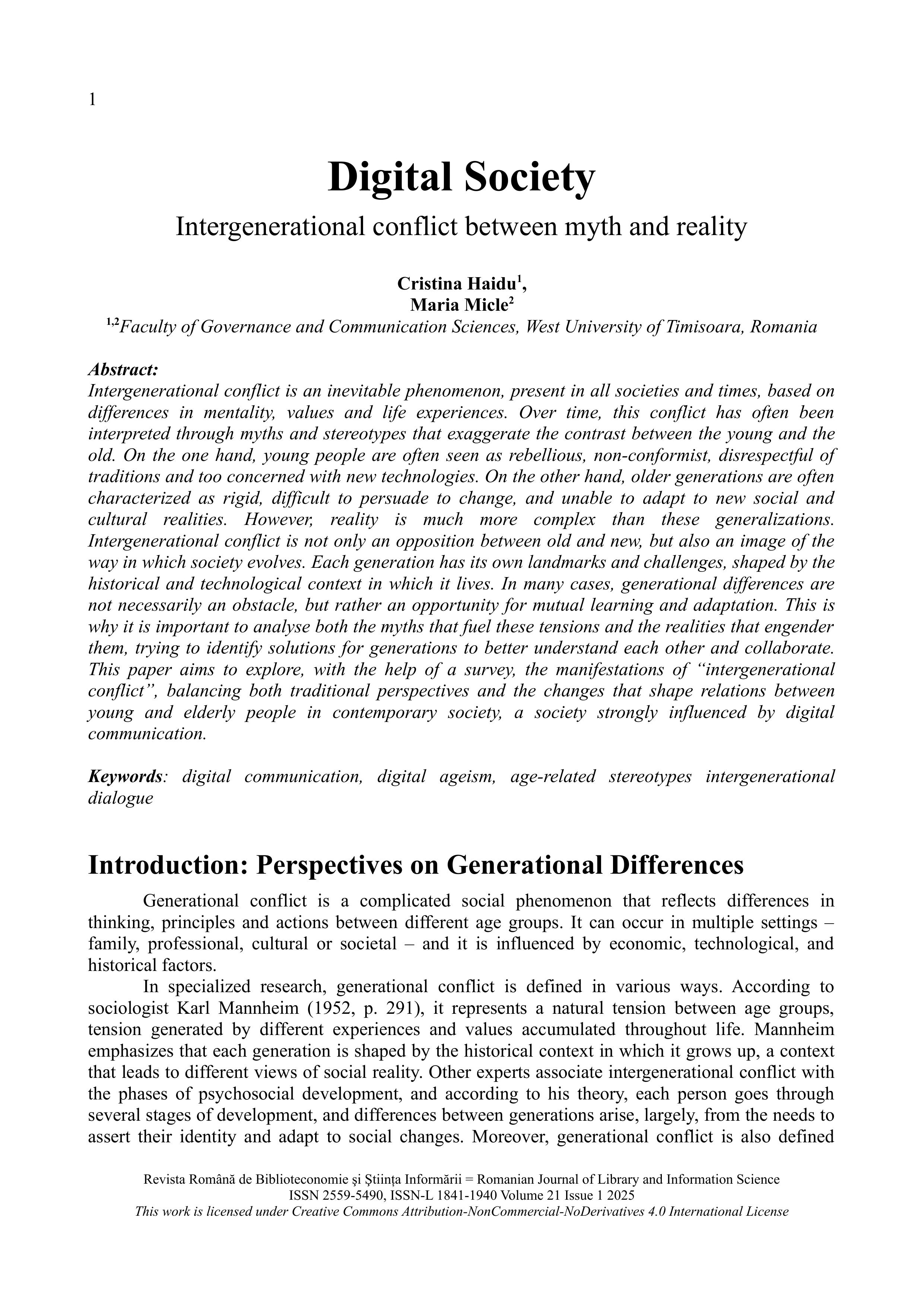Digital Society: Intergenerational conflict between myth and reality
Intergenerational conflict between myth and reality
DOI:
https://doi.org/10.26660/rrbsi.2025.21.1.02Keywords:
digital communication, digital ageism, age-related stereotypes, intergenerational dialogueAbstract
Intergenerational conflict is an inevitable phenomenon, present in all societies and times, based on differences in mentality, values and life experiences. Over time, this conflict has often been interpreted through myths and stereotypes that exaggerate the contrast between the young and the old. On the one hand, young people are often seen as rebellious, non-conformist, disrespectful of traditions and too concerned with new technologies. On the other hand, older generations are often characterized as rigid, difficult to persuade to change, and unable to adapt to new social and cultural realities. However, reality is much more complex than these generalizations. Intergenerational conflict is not only an opposition between old and new, but also an image of the way in which society evolves. Each generation has its own landmarks and challenges, shaped by the historical and technological context in which it lives. In many cases, generational differences are not necessarily an obstacle, but rather an opportunity for mutual learning and adaptation. This is why it is important to analyse both the myths that fuel these tensions and the realities that engender them, trying to identify solutions for generations to better understand each other and collaborate. This paper aims to explore, with the help of a survey, the manifestations of “intergenerational conflict”, balancing both traditional perspectives and the changes that shape relations between young and elderly people in contemporary society, a society strongly influenced by digital communication.
References
Ayalon, L., & Tesch-Römer, C. (2018). Taking a closer look at ageism: Self- and other-directed ageist attitudes and discrimination. European Journal of Ageing, 15(4), pp. 1-7. https://doi.org/10.1007/s10433-018-0488-0
Bennett, S., Maton, K., & Kervin, L. (2008). The ‘digital natives’ debate: A critical review of the evidence. British Journal of Educational Technology, 39(5), pp. 775-786. https://doi.org/10.1111/j.1467-8535.2007.00793.x
Berger, J., & Milkman, K. L. (2012). What makes online content viral? Journal of Marketing Research, 49(2), 192–205. https://journals.sagepub.com/doi/10.1509/jmr.10.0353
Butler, R. N. (1969). Age-ism: Another form of bigotry. The Gerontologist, 9(4 Part 1), pp. 243-246.
Butler, R. N. (1969). Age-ism: Another form of bigotry. The Gerontologist, 9(4 Part 1), pp. 243-246. https://doi.org/10.1093/geront/9.4_Part_1.243
Castells, M. (2009). Communication power. Oxford University Press.
Finkelstein, L. M., Ryan, K. M., & King, E. B. (2015). What do the young (old) people think of me? Content and accuracy of age-based metastereotypes. Journal of Organizational Behavior, 36(1), pp. 46-59.
Fraser, S., Lagacé, M., Bongué, B., Ndeye, N., Guyot, J., Bechard, L., Garcia, L., Taler, V., CCNA Social Inclusion and Stigma Working Group, Adam, S., & Aubertin-Leheudre, M. (2020). Ageism and COVID-19: What does our society’s response say about us? Age and Ageing, 49(5), pp. 692-695. https://doi.org/10.1093/ageing/afaa097
Helsper, E. J., & Eynon, R. (2010). Digital natives: Where is the evidence? British Educational Research Journal, 36(3), pp. 503-520. https://doi.org/10.1080/01411920902989227
Jenkins, H. (2006). Convergence culture: Where old and new media collide. NYU Press.
Mannheim, K. (1952). The problem of generations. In P. Kecskemeti (Ed.), Essays on the Sociology of Knowledge, pp. 276–322. Routledge.
McCrindle, M., & Fell, A. (2021). Generation Alpha: Understanding our children and helping them thrive. Hachette Australia.
McQuail, D. (2010). McQuail’s mass communication theory (6th ed.). Sage Publications.
Mead, M. (1970). Culture and commitment: A study of the generation gap. Natural History Press.
Mehrabian, A. (1971). Silent messages. Belmont, CA: Wadsworth.
Ng, E. S., Schweitzer, L., & Lyons, S. T. (2010). New generation, great expectations: A field study of the Millennial generation. Journal of Business and Psychology, 25, pp. 281-292.
North, M. S., & Fiske, S. T. (2015). Intergenerational resource tensions: A review and future directions. Psychological Bulletin, 141(3), pp. 525-554.
Pariser, E. (2011). The filter bubble: What the Internet is hiding from you. Penguin Press.
Pew Research Center. (2014). Millennials in adulthood: Detached from institutions, networked with friends. https://www.pewresearch.org/social-trends/2014/03/07/millennials-in-adulthood/
Pew Research Center. (2021). The State of Online Harassment. https://www.pewresearch.org/internet/2021/01/13/the-state-of-online-harassment/
Posthuma, R. A., & Campion, M. A. (2009). Age stereotypes in the workplace: Common stereotypes, moderators, and future research directions. Journal of Management, 35(1), pp. 158-188.
Prensky, M. (2001). Digital natives, digital immigrants. On the Horizon, 9(5), pp. 1-6.
Seemiller, C., & Grace, M. (2016). Generation Z goes to college. Jossey-Bass.
Strauss, W., & Howe, N. (1991). Generations: The history of America's future, 1584 to 2069. Harper Perennial.
Suler, J. (2004). The online disinhibition effect. CyberPsychology & Behavior, 7(3), pp. 321-326.
Tapscott, D. (2009). Grown up digital: How the net generation is changing your world. New York: McGraw-Hill.
Taylor, P., & Keeter, S. (Eds.). (2010). Millennials: Confident. Connected. Open to change. Pew Research Center. https://www.pewresearch.org/social-trends/2010/02/24/millennials-confident-connected-open-to-change/
Twenge, J. M. (2020). Generația internetului. București: Baroque Books &Arts.
Van Dijk, J. (2020). The Digital Divide. Polity Press. https://www.researchgate.net/publication/336775102_The_Digital_Divide

Published
How to Cite
Issue
Section
License
Copyright (c) 2025 Romanian Library Association

This work is licensed under a Creative Commons Attribution-NonCommercial-NoDerivatives 4.0 International License.
All articles from RRBSI are licensed under a Creative Commons Attribution-NonCommercial-NoDerivatives 4.0 International (CC BY-NC-ND 4.0) License.





